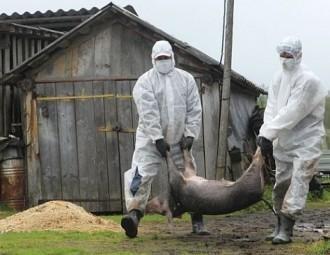Aliaksei Tsiul’kou: Hiding information about the African swine only stimulates epidemics

The civil society activist and veterinary surgeon believes that it is the current state of Belarusan veterinary service that caused uncontrollable spread of ASF all over the country.
Aliaksei Tsiul’kou, working deputy of Asipovichy local council, in the talk with the EuroBelarus Information Service noted that the nervous reaction of state officials shows “how serious is the situation with the African swine fever (ASF) in the country”.
- The situation in the agriculture is really bad, as the economic productivity of Belarusan pig-farming is rather low in comparison to the world leaders in this area. Moreover, our production is quite expensive and uncompetitive. And everything that leads to price growth all the more narrows our foreign economic activity. The closure of foreign markets because of the ASF is a catastrophe. Our country has more than 100 pig farms, which means that our domestic market can’t consume that much of its production. That is why the authorities did everything possible in order not to stop the spread of the disease , but so that the information about it remained undiscovered.
- As far as I know, experts gave their negative forecasts about the ASF 3 years ago. Why there hasn’t been any reaction of the veterinary service then?
- It is the most critical moment, as the work of our veterinary service differs from that in the developed countries. Elsewhere in civilized world veterinary service is an independent system, which performs supervisory functions and is not subject to anyone. Basically, it is an independent body; whereas our veterinary service is subject to the Ministry of Agriculture. Besides, veterinary surgeons, who work there, get their salary from this ministry, which means they have no possibility of influencing the negative situation. Veterinary service has to be independent; and this systemic mistake has, probably, led to the situation we see today. Moreover, I cannot but say about the shortage of personnel in rural area, as no one wants to work in rather tough conditions for the salary of about 150 euro.
- How can you comment on the actions of the authorities after the information about the outbreak of ASF in Hrodna and Vitsiebsk region got publicity?
- According to the world practice, the quarantine is imposed within a radius of up to 20 kilometers. Within this zone the whole pig population has to be exterminated. Though ASF represents no danger for people, it has to be stopped by exterminating the whole herd, while Belarusan know-how - buffer zones five kilometers long round all the pig farms – is the consequence of insanitation, accumulated over the last years.
- Give your access of today’s situation with the ASF in Belarus.
- Let me first note that these are only my assumptions built according to various indirect signs, as the authorities give no accurate information. Perhaps, some new sources of infection are being detected. However, there are no announcements about it to prevent the imposition of export ban on the production. Because it is clear that in case the whole Belarusan territory falls under such ban, it will be no exaggeration to say this is a catastrophe. The sources of infections are liquidated without prior arrangement; clean-up is carried out, though nobody talks about it. It is also possible that more pervasive clean-up is going on as preventive measures.
There are two approaches to liquidate ASF: to register all the pig population and to trace its travel across the country or to kill all the pig population in the area contaminated with ASF. Whereas our country decided to choose the third and, perhaps, the most dangerous approach, when the private pig population is killed and that at the pig farms is retained, though it doesn’t matter for the ASF causative agent whether the pig belongs to private owner or to the state. Perhaps the Ministry of Agriculture believes that it is easier to control a hundred pig farms than dozens of small private farms.
I want to emphasize that the biggest mistake the state has made is the information hiding: people become suspicious to the authorities, which will result in non-observance of the requirements. Whereas open information and coordinated action is more successful tactics. Lack of agreement will only stimulate epidemics.
-
03.01
-
07.10
-
22.09
-
17.08
-
12.08
-
30.09



























